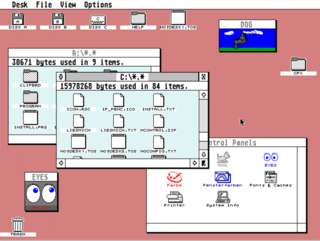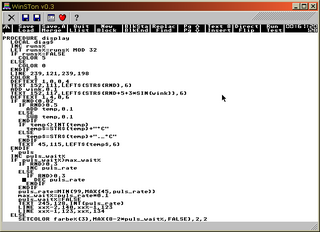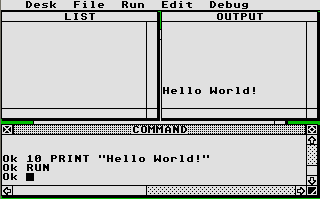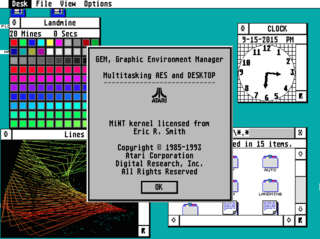
Atari ST is a line of personal computers from Atari Corporation and the successor to the Atari 8-bit family. The initial model, the Atari 520ST, had limited release in April–June 1985, and it was widely available in July. The ST was the first personal computer with a bitmapped color graphical user interface, using a version of Digital Research's GEM interface / operating system, from February 1985.

AMOS BASIC is a dialect of the BASIC programming language for the Amiga computer. Following on from the successful STOS BASIC for the Atari ST, AMOS BASIC was written for the Amiga by François Lionet with Constantin Sotiropoulos and published by Europress Software in 1990.

EmuTOS is a replacement for TOS, released as free software. It is mainly intended to be used with Atari emulators and clones, such as Hatari or FireBee. EmuTOS provides support for more modern hardware and avoids the use of the old, proprietary TOS as it is usually difficult to obtain.

GFA BASIC is a dialect of the BASIC programming language, by Frank Ostrowski. The name is derived from the company, which distributed the software. In the mid-1980s to the 1990s it enjoyed popularity as an advanced BASIC dialect, but has been mostly superseded by several other programming languages. Official support ended in the early 2000s.

Level 9 was a British developer of computer software, active between 1981 and 1991. Founded by Mike, Nicholas and Pete Austin, the company produced software for the BBC Micro, Nascom, ZX Spectrum, Commodore 64, Oric, Atari, Lynx 48k, RML 380Z, Amstrad CPC, MSX, Amiga, Apple II, Memotech MTX, and Enterprise platforms and is best known for its successful text adventure games until a general decline in the text adventure market forced their closure in June 1991.
François Lionet is a French programmer, best known for having written STOS BASIC on the Atari ST and AMOS BASIC on the Amiga. He has also written several games on these platforms.

Clickteam is a French software development company based in Boulogne-Billancourt, Hauts-de-Seine. Founded by Francis Poulain, François Lionet and Yves Lamoureux, Clickteam is best known for the creation of Clickteam Fusion, a script-free programming tool that allows users to create video games or other interactive software using a highly advanced event system. They are most known for publishing the first seven titles in the Five Nights at Freddy's series.
Constantin Sotiropoulos is the co-creator of AMOS BASIC, a popular video game and multimedia programming language for the Amiga computer, and STOS BASIC on the Atari ST. He has also been creator of copy protection software for some French companies.

Atari ST BASIC was the first dialect of BASIC that was produced for the Atari ST line of computers. This BASIC interpreter was bundled with all new STs in the early years of the ST's lifespan, and quickly became the standard BASIC for that platform. However, many users disliked it, and improved dialects of BASIC quickly came out to replace it.
Optimized Systems Software (OSS) was a company that produced disk operating systems, programming languages with integrated development environments, and applications primarily for the Atari 8-bit family of home computers. OSS was best known for their enhanced versions of Atari DOS, Atari BASIC, and the Atari Assembler Editor, all of which were substantially improved over Atari's products, as well as the Action! programming language. OSS also sold some software for the Apple II.
The Atari Coldfire Project (ACP) is a volunteer project that has created a modern Atari ST computer clone called the FireBee.
Europress was a British magazine and software publisher based in Adlington, near Macclesfield, Cheshire. Their magazine publishing business was previously known as Database Publications. The software division was renamed in 1999 to Actualize.

Hatari is an open-source emulator of the Atari ST 16/32-bit computer system family. It emulates the Atari ST, Atari STe, Atari TT, and Atari Falcon computer series and some corresponding peripheral hardware like joysticks, mouse, midi, printer, serial and floppy and hard disks. It supports more graphics modes than the ST and does not require an original TOS image as it supports EmuTOS. The latest version has no reported issues with the ST/STe/TT applications emulation compatibility and also most of the ST/STe games and demos work without issues.

TOS is the operating system of the Atari ST range of computers. This range includes the 520ST and 1040ST, their STF/M/FM and STE variants and the Mega ST/STE. Later, 32-bit machines were developed using a new version of TOS, called MultiTOS, which allowed multitasking. More recently, users have further developed TOS into FreeMiNT.
MagiC is a third party and now open-sourced multitasking-capable TOS-compatible operating system for Atari computers, including some newer clone systems manufactured later. There are also variants that run as part of Mac and PC emulation environments, as well as on macOS Intel-Mac computers.

Fun School is a series of educational packages developed and published in the United Kingdom by Europress Software, initially as Database Educational Software. The original Fun School titles were sold mostly by mail order via off-the-page adverts in the magazines owned by Database Publications. A decision was made to create a new set of programs, call the range Fun School 2, and package them more professionally so they could be sold in computer stores around the UK. Every game comes as a set of three versions, each version set to cater for a specific age range.

Hollywood is a commercially distributed programming language developed by Andreas Falkenhahn which mainly focuses on the creation of multimedia-oriented applications. Hollywood is available for AmigaOS, MorphOS, WarpOS, AROS, Windows, macOS, Linux, Android, and iOS. Hollywood has an inbuilt cross compiler that can automatically save executables for all platforms supported by the software. The generated executables are completely stand-alone and do not have any external dependencies, so they can also be started from a USB flash drive. An optional add-on also allows users to compile projects into APK files.
This article deals with programming languages used in the Amiga line of computers, running the AmigaOS operating system and its derivatives AROS and MorphOS. It is a split of the main article Amiga software. See also related articles Amiga productivity software, Amiga music software, Amiga Internet and communications software and Amiga support and maintenance software for other information regarding software that runs on Amiga.
Scetlander was a software publisher which released titles for various 8- and 16-bit home computer systems in the 1980s and 1990s.











